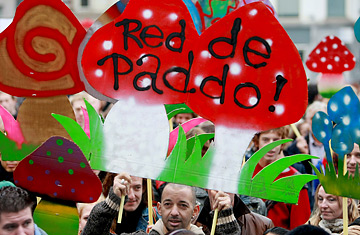
Charles Overby is not optimistic about his future. The bearded American works in
a so-called smart-shop, selling hallucinogenic mushrooms in Amsterdam’s touristy Rembrantsplein area. When he first arrived in the Netherlands in 1998, paddos, as they are locally known, were legal, and the country seemed like
an enlightened sanctuary of mind expansion. “I consider myself as the facilitator
of a shamanic journey, and I take that very seriously,” he says. But now that Overby is planning to buy the store he’s been working in, the Dutch government proposes to ban his main line of merchandise, and parliament is set to agree. For him, the ban is not just a threat to his livelihood, but to his beliefs. “To us, this is a religious
issue,” he says.
No doubt he means it. But to Ab Klink, the Dutch Minister for Health, the ban is
about public health and social order. Roughly a hundred tourists a year are driven away in an Amsterdam ambulance after mushroom consumption. The fact that almost all incidents involve foreign tourists led Klink to the conclusion, he
says, that “it is absolutely undesirable that citizens of neighboring countries run
these health risks.” But the ban could end up promoting other mind-blowing compounds, some of which pack more punch — and carry more risks — than magic mushrooms.
The ban is perceived as a departure from
the country’s long-standing approach of seeking pragmatic solutions that aim to reduce
the harm of drug use. Questions of drug legality here are hardly a matter of principle. Relatively light drugs as marijuana are not prosecuted in an attempt to
isolate their use from that of more addictive drugs, and health services trade
used heroin needles for fresh ones to prevent the spread of diseases like AIDS.
Along this line of
reasoning, paddos are a relative blessing. “Paddos now dominate the market for trips, and
that has only advantages,” says August de Loor, a veteran drugs consultant. “LSD use is down over the last couple of years, and we have seen the concentrations of LSD in a trip decline, because the relatively light paddo has
become the norm.”
Rogier Bos, speaking for the
expert body that advised the minister on the issue, agrees. “If these consumers switch back to LSD, public health will suffer.” The synthetic hallucinogen, which has been banned since 1966, is usually sold as a
piece of impregnated paper, and thus easier to hide and trade than the bulky mushrooms.
LSD is not the only drug set to benefit from a paddo ban. Some experts predict that San Pedro, a cactus of the Andes, could fill some of the hallucinogenic void in the wake of the mushroom ban. And a range of other flora remains off the radar, and thus not prohibited, according to Bos. “There are so many blossoms or cacti that can be tried,” he says. “We can’t
even scientifically say if these products cause a hallucinogenic effect, let alone
what the health risks may be.”
Proponents of a ban are not impressed by fears of illegal trade of other products, saying such concerns could be voiced over any government ban. “The legal sale of mushrooms was an awkward situation to start with, and this bill
puts that right, parliamentarian Fred Teeven of the right-wing liberal VVD says.
But he too admits that upholding prohibition will be hard, and the municipality of
Amsterdam has expressed concern that enforcing it will put a heavy burden on the police.
Retailer Charles Overby points to the street outside his shop to indicate who will
take over his trade. “Quick sales, no advice, and more ambulance calls,” he predicts. As for himself, he’ll try to run his store on the jewelry and ceremonial
statues he sells. And perhaps other hallucinogens? “We don’t want to speculate
on what we might sell, because we don’t know what is going to be prohibited,”
he says. “We have no intention of selling illegal things, and that’s it.” But if the logic of the mushroom ban takes hold in the Netherlands, the list of illegal things could get longer.